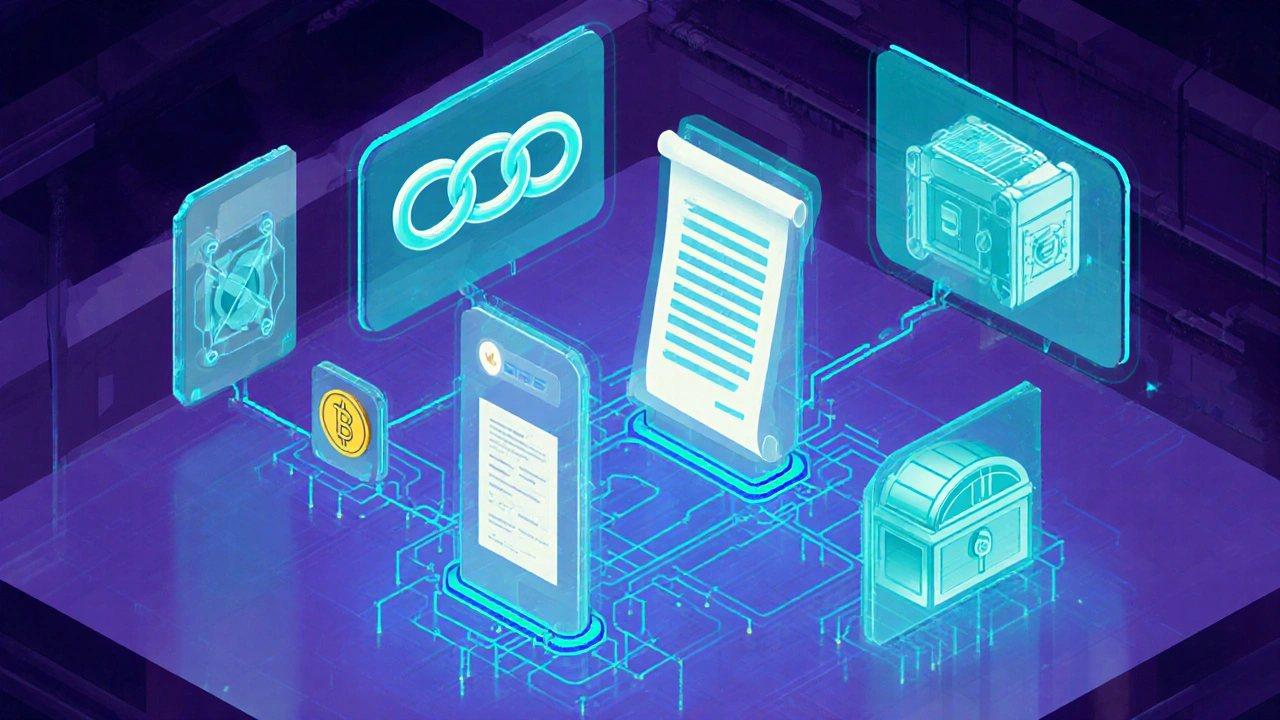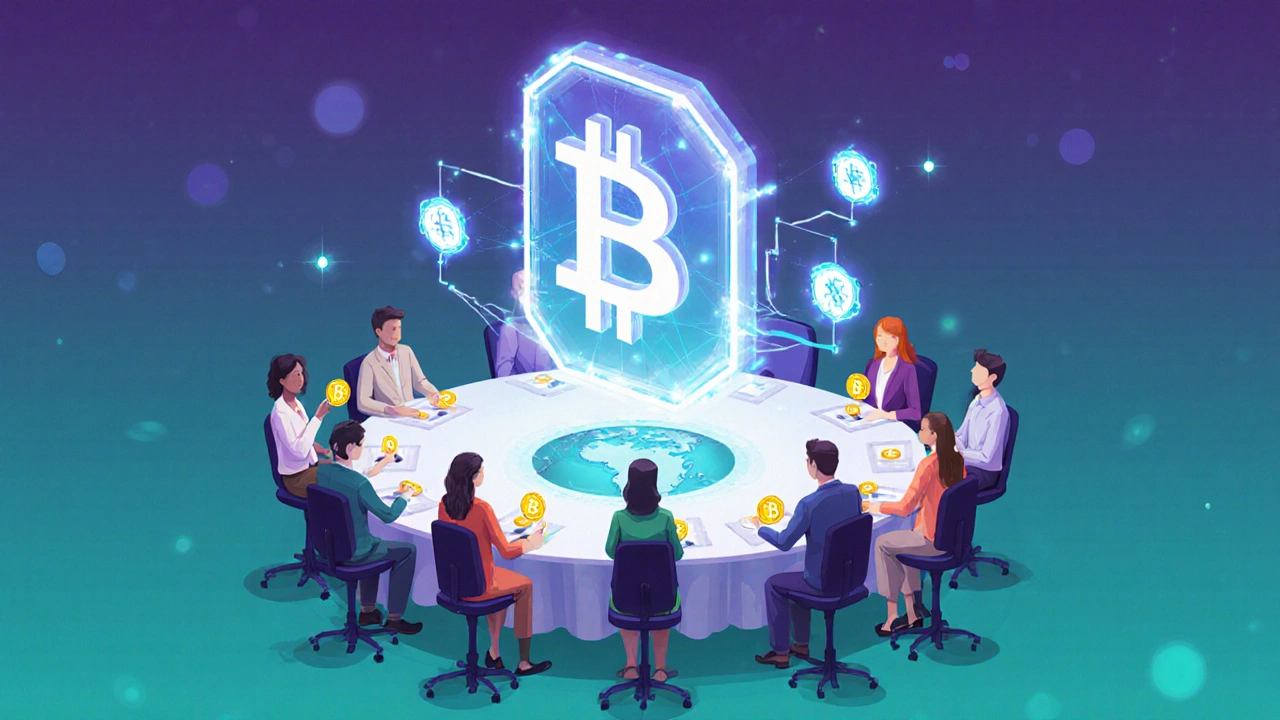The term DAO has become a buzzword in the crypto world, but many people still wonder what it actually means and why it matters. In this guide we’ll break down the concept in plain language, walk through the technology that makes it possible, highlight real‑world examples, and give you a clear path if you want to join or start one yourself.
What a DAO Really Is
DAO is a decentralized autonomous organization that runs on blockchain code instead of a traditional management team. In other words, a DAO is a group of people who make collective decisions through smart contracts, without needing a central authority to tell them what to do. The code is transparent, the rules are immutable (unless the community votes to change them), and every transaction is recorded on a public ledger.
How a DAO Works: The Core Building Blocks
Understanding a DAO means getting familiar with a few key pieces of infrastructure. Each piece is an entity on its own, and together they form the engine of a decentralized organization.
- Blockchain is the underlying distributed ledger that stores every transaction and contract execution. Most DAOs today live on Ethereum, a programmable blockchain that supports complex logic.
- Smart contract is a self‑executing piece of code stored on the blockchain. It defines the DAO’s rules-how proposals are submitted, how voting works, and how funds are moved.
- Token serves as the membership badge and voting power. Holding more tokens usually means more influence, though some DAOs use quadratic voting to level the playing field.
- Governance describes the processes by which members propose, discuss, and vote on changes. Governance can be simple (one‑token‑one‑vote) or sophisticated (delegated voting, reputation systems).
- Voting is the act of signaling approval or rejection on a proposal. Votes are recorded on‑chain, making the outcome tamper‑proof.
- Treasury holds the crypto assets that the DAO controls. Funds are released only when a proposal passes the voting threshold.
When you put these pieces together, you get a business‑like entity that can fund projects, manage assets, or run social clubs-all without a CEO.
Why People Love DAOs: Benefits Over Traditional Structures
DAOs offer several advantages that appeal to crypto enthusiasts and entrepreneurs alike:
- Transparency: Every rule and transaction is visible on the blockchain, eliminating hidden fees or back‑room deals.
- Global participation: Anyone with an internet connection and a compatible wallet can become a member, breaking down geographic barriers.
- Reduced bureaucracy: Proposals are executed automatically once they meet the voting criteria, cutting down on paperwork and middlemen.
- Aligned incentives: Token holders benefit directly from the DAO’s success, creating a self‑reinforcing loop of motivation.
- Programmable flexibility: Smart contracts can be updated (through governed upgrades) to adapt to new use‑cases without dissolving the organization.

Risks and Challenges to Watch Out For
No technology is perfect, and DAOs have their own set of pitfalls:
- Code vulnerabilities: Bugs in smart contracts can be exploited, as seen in the early DAO hack of 2016 that led to a controversial hard fork.
- Governance attacks: If a single entity acquires a majority of voting tokens, they can seize control-what’s known as a “51% attack” in the governance context.
- Regulatory uncertainty: Many jurisdictions are still figuring out how to treat DAOs-whether as partnerships, securities, or something entirely new.
- Coordination overhead: Large DAOs can suffer from decision‑fatigue, where too many proposals drown out the most important ones.
- Liquidity issues: Treasury assets might be locked in illiquid tokens, making it hard to fund urgent projects.
Being aware of these risks helps you design safeguards-like multisig wallets, timelocks, and reputation‑based voting.
Real‑World DAO Examples in 2024‑2025
Seeing DAOs in action makes the concept feel less abstract. Here are five noteworthy examples that illustrate the range of possibilities:
- MakerDAO: One of the oldest finance‑focused DAOs, it governs the DAI stablecoin. Token holders vote on risk parameters and collateral types.
- Uniswap DAO: Controls the protocol fees and future upgrades for the Uniswap decentralized exchange. Governance decisions are made using UNI token votes.
- Friends With Benefits (FWB): A social DAO that issues its own token (FWB) to grant access to exclusive events, NFTs, and community projects.
- PleasrDAO: An art‑collective that pools funds to purchase high‑valued NFTs and commissions, with each member sharing the upside.
- LAO (Limited‑Liability Autonomous Organization): Created in 2023, it combines a traditional legal entity with a DAO structure, allowing accredited investors to pool capital for crypto startups while retaining on‑chain governance.
How to Join or Create Your Own DAO
If you’re curious about becoming a member or launching a DAO, follow these steps. The process is similar whether you’re joining an existing community or building from scratch.
- Set up a wallet: Install a non‑custodial wallet (e.g., MetaMask, Trust Wallet) and secure your seed phrase.
- Acquire the relevant token: Most DAOs require you to hold their native token. Purchase it on a reputable exchange or through a decentralized swap.
- Connect to the DAO’s platform: Many DAOs use governance portals like Snapshot, Aragon, or DAOhaus. Link your wallet and verify your voting power.
- Participate in discussions: Join the Discord, Telegram, or forum where proposals are debated. Listening first helps you understand the culture.
- Vote on proposals: When a vote opens, review the details, then cast your vote directly from the portal. Your vote is recorded on‑chain.
- For creators - define the rules: Draft a smart contract or use a template (Aragon, OpenZeppelin) that outlines token emission, quorum thresholds, and treasury management.
- Deploy and launch: Publish the contract on your chosen blockchain, mint the governance token, and announce the DAO to the community.
Remember, a healthy DAO requires active participation. The more you engage, the more value you and the organization create together.
Regulatory Landscape and Future Outlook
Governments around the world are catching up with the rapid rise of DAOs. In the United States, the SEC has signaled that some DAO tokens may be treated as securities, especially if they promise profits from the efforts of others. The Wyoming legislature, on the other hand, recognized DAOs as a legal entity in 2021, offering a template for future state‑level frameworks.
European regulators are focusing on anti‑money‑laundering (AML) compliance, requiring DAO treasury wallets to implement know‑your‑customer (KYC) procedures for large transactions. In Asia, Singapore’s MAS has introduced a “DAO sandbox” that lets projects test governance models under supervised conditions.
Looking ahead, three trends seem certain:
- Hybrid legal structures: More DAOs will pair on‑chain governance with an off‑chain legal wrapper (LLC, foundation) to gain banking access and legal certainty.
- Layer‑2 adoption: Scaling solutions like Optimism and Arbitrum will lower transaction fees, making frequent voting more affordable.
- Inter‑DAO collaboration: Networks of DAOs will start forming alliances, sharing liquidity pools and co‑governing cross‑chain projects.
Comparison of Common DAO Types
| DAO Type | Primary Goal | Typical Token | Governance Model | Popular Example |
|---|---|---|---|---|
| Protocol DAO | Manage a blockchain protocol or DeFi product | Utility token (e.g., UNI, MKR) | Token‑weighted voting with quorum | Uniswap DAO |
| Investment DAO | Pool capital to invest in startups or NFTs | Equity‑like or profit‑sharing token | Quadratic voting + delegate system | LAO |
| Social DAO | Build community experiences and content | Access token (e.g., FWB) | Reputation‑based voting | Friends With Benefits |
| Grant DAO | Distribute funds to open‑source projects | Governance token with vesting schedule | Multi‑sig approval + community voting | Gitcoin Grants DAO |
Frequently Asked Questions
What does DAO stand for?
DAO means Decentralized Autonomous Organization. It’s a group that runs its rules through code on a blockchain instead of a central manager.
Do I need technical skills to join a DAO?
No. Most DAOs provide user‑friendly dashboards where you can vote, discuss, and claim rewards with just a crypto wallet. Technical knowledge helps but isn’t required.
How are decisions made inside a DAO?
Members submit proposals, discuss them on community channels, and then vote. The voting power usually comes from holding the DAO’s token, though some DAOs use reputation or quadratic voting to balance influence.
Can a DAO own real‑world assets?
Yes. Some DAOs have purchased physical art, real estate, or even stakes in companies, storing ownership proofs on‑chain as NFTs or tokenized shares.
Is joining a DAO risky?
There are risks: smart‑contract bugs, potential loss of funds, and regulatory uncertainty. Always do your own research, start with a small amount, and prefer DAOs with audited contracts.

